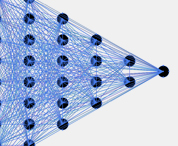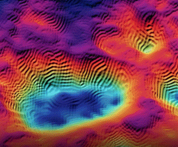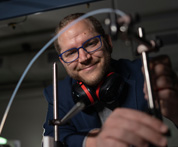Leah Houri-Zeevi’s PhD work in the Sagol School of Neuroscience at Tel Aviv University revealed the rules of transgenerational inheritance in C. elegans nematodes (roundworms), making an important contribution to the field of epigenetics.
For her postdoc work in Neurogenetics and Behavior at Rockefeller University in New York, she chose to study mosquitoes, the deadliest animals on the planet. Female Aedes aegypti mosquitoes infect millions of people with dengue, Zika virus and yellow fever. Remarkably, they mate only a single time in their entire lives – collecting enough sperm to provision the fertilization of thousands of eggs in their lifetime, despite being pestered constantly by male mosquitoes. Dr. Houri-Zeevi investigated the genetic and neural circuit basis of this unusual behavior. In parallel, using Aedes aegypti and a collection of “exotic” species of mosquitoes, Dr. Houri-Zeevi studied the genomic evolution of mosquitoes and the mechanisms by which rare mosquito species lost their appetite for blood.
In the Neurobiology Department at Tel Aviv University, Dr. Houri-Zeevi’s lab’s goal is to identify common molecular strategies in the evolution of the mosquitoes’ nervous system and the behavior that is encoded by it, and to reveal the genetic and nongenetic mechanisms of these processes. A deeper understanding of the molecular mechanisms that trigger the female’s reproductive behavior could provide new tools for limiting mosquito reproduction – and new insights that could shed light on the evolution of behavior and the nervous system, with important implications for fighting mosquito-borne diseases and improving public health.
 ISRAELI COUNCIL FOR HIGHER EDUCATION
ISRAELI COUNCIL FOR HIGHER EDUCATION MIT-Israel Zuckerman STEM Fund for Faculty Collaboration
MIT-Israel Zuckerman STEM Fund for Faculty Collaboration The Zuckerman Travel and Research STEM Fund at Harvard
The Zuckerman Travel and Research STEM Fund at Harvard Zuckerman AI Fund at Technion
Zuckerman AI Fund at Technion Alan Alda Communicating Science
Alan Alda Communicating Science Zuckerman Institute – ScienceAbroad
Zuckerman Institute – ScienceAbroad Zuckerman Institute – America-Israel Friendship League partnership
Zuckerman Institute – America-Israel Friendship League partnership


























